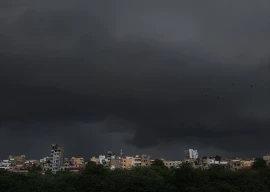
So, our official energy planners need to study the market trends closely, keeping a watch on world production trends along with projections of demand for the next decade or so and plan accordingly to keep the national economy protected from the volatility of world oil prices. The best options should be to accelerate work on Diamer-Bhasha dam as well as undertake a fresh feasibility study of the waterfalls in Khyber-Pakhtunkhwa to exploit their power production potential.
Both Saudi Arabia and the US appear hell-bent on pumping out their black gold without even a pause. The world’s biggest oil importer — the US — is now facing a domestic glut of its own; therefore, it had to cut down on its oil imports drastically. And the biggest exporters of oil to the US — the Middle East oil producers led by Saudi Arabia plus Nigeria and Algeria — are offering the excess quantities in their hands to other markets at any price that they could get. Canadian and Iraqi oil production and exports are rising year after year. Even the Russians, with all their economic problems, are managing to keep pumping.
Conspiracy theorists believe that the US is producing more than the quantity it needs for domestic consumption to run Russia out of the market and the Saudis are doing it to price the Iranians out of the world oil market, denying them any immediate benefits from the lifting of sanctions. Even if the conspiracy theories are dismissed as too far fetched, the oil glut is likely to persist for many years to come.
After the latest data from the American Petroleum Institute showed another huge build in reserves of 4.6 million barrels, US benchmark West Texas Intermediate hit its lowest level since May 2003, of below $27 a barrel. Brent crude also fell to a new near 13-year low of $27.2 at one point. Prices have recovered a few times last year, but a barrel of oil has already sunk this year to its lowest level since 2004. Market experts think it will be years, if at all, before oil returns to $90 or $100 a barrel, which was what oil fetched during the last decade on an average.
Since the economies of Europe and emerging Asian markets, including China and India, are weak at the moment the demand has also weakened. Meanwhile, oil consuming machines as well as two- and four-wheelers have become more energy efficient. World oil production has generally increased since 1996 to more than 80 million barrels a day from 63 million barrels a day. When supplies do not keep up with demand or when demand is less than the supplies, the prices fall and spike accordingly. That is why world oil prices spiked steeply in 2011 and fell so steeply in 2015.
A central factor in the sharp price declines is said to be the continuing unwillingness of OPEC, a cartel of oil producers, to intervene to stabilise markets that are widely viewed as oversupplied. Iran, Venezuela, Ecuador and Algeria have been pressing the cartel to cut production to firm up prices, but Saudi Arabia, the United Arab Emirates and other gulf allies are refusing to do so. At the same time, Iraq is actually pumping more, and Iran is expected to become a major exporter again.
Published in The Express Tribune, January 23rd, 2016.
Like Opinion & Editorial on Facebook, follow @ETOpEd on Twitter to receive all updates on all our daily pieces.













COMMENTS (1)
Comments are moderated and generally will be posted if they are on-topic and not abusive.
For more information, please see our Comments FAQ